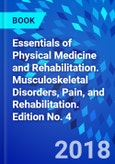- Presents each topic in a consistent, quick-reference format that includes a description of the condition, discussion of symptoms, examination findings, functional limitations, and diagnostic testing. An extensive treatment section covers initial therapies, rehabilitation interventions, procedures, and surgery.
- Contains new technology sections in every treatment area where recently developed technologies or devices have been added to the therapeutic and rehabilitation strategies, including robotic exoskeletons, wearable sensors, and more.
- Provides extensive coverage of hot topics in regenerative medicine, such as stem cells and platelet rich plasma (PRP), as well as a new chapter on abdominal wall pain.
- Delivers the knowledge and insights of several new, expert authors for innovative perspectives in challenging areas.
- Offers a clinically-focused, affordable, and focused reference for busy clinicians, as well as residents in need of a more accessible and targeted resource. - Enhanced eBook version included with purchase. Your enhanced eBook allows you to access all of the text, figures, and references from the book on a variety of devices.
Table of Contents
Frontera: Essentials of Physical Medicine and RehabilitationPart 1. MSK disorders
SECTION 1. Head, Neck, and Upper Back
1. Cervical Spondylotic Myelopathy
2. Cervical Facet Arthropathy
3. Cervical Degenerative Disease
4. Cervical Radiculopathy
5. Cervical Dystonia
6. Cervical Sprain or Strain
7. Cervical Spinal Stenosis
8. Cervicogenic Vertigo
9. Trapezius Strain
SECTION 2. Shoulder
10. Acromioclavicular Injuries
11. Adhesive Capsulitis
12. Biceps Tendinopathy
13. Biceps Tendon Rupture
14. Glenohumeral Instability
15. Labral Tears of the Shoulder
16. Rotator Cuff Tendinopathy
17. Rotator Cuff Tear
18. Scapular Winging
19. Shoulder Arthritis
20. Suprascapular Neuropathy
SECTION 3. Elbow and Forearm
21. Elbow Arthritis
22. Lateral Epicondylitis (Tennis elbow)
23. Medial Epicondylitis (Golfer's elbow)
24. Median Neuropathy
25. Olecranon Bursitis
26. Radial Neuropathy
27. Ulnar Neuropathy (elbow)
SECTION 4. Hand and Wrist
28. de Quervain's Tenosynovitis
29. Dupuytren's Contracture
30. Extensor Tendon Injuries
31. Flexor Tendon Injuries
32. Hand and Wrist Ganglia
33. Hand Osteoarthritis
34. Hand Rheumatoid Arthritis
35. Kienböck's Disease
36. Median Neuropathy (Carpal Tunnel Syndrome)
37. Trigger Finger
38. Ulnar Collateral Ligament Sprain
39. Ulnar Neuropathy (wrist)
40. Wrist Osteoarthritis
41. Wrist Rheumatoid Arthritis
SECTION 5. Mid Back
42. Thoracic Compression Fracture
43. Thoracic Radiculopathy
44. Thoracic Sprain or Strain
SECTION 6. Low Back
45. Lumbar Degenerative Disease
46. Lumbar Facet Arthropathy
47. Lumbar Radiculopathy
48. Low Back Strain or Sprain
49. Lumbar Spondylolysis and Spondylolisthesis
50. Lumbar Spinal Stenosis
51. Sacroiliac Joint Dysfunction
SECTION 7. Pelvis, Hip, and Thigh
52. Adhesive Capsulitis of the Hip
53. Adductor Strain
54. Femoral Neuropathy
55. Hip Osteoarthritis
56. Labral Tear of the Hip
57. Lateral Femoral Cutaneous Neuropathy
58. Piriformis Syndrome
59. Pubalgia
60. Quadriceps Contussion
61. Total Hip Replacement
62. Greater Trochanteric Pain Syndrome
SECTION 8. Knee and Leg
63. Anterior Cruciate Ligament Sprain
64. Baker's Cyst
65. Chondral Injuries
66. Collateral Ligament Sprain
67. Compartment Syndrome of the Leg
68. Hamstring Strain
69. Iliotibial Band Syndrome
70. Knee Osteoarthritis
71. Knee Bursitis
72. Meniscal Injuries
73. Patellar Tendinopathy
74. Patellofemoral Syndrome
75. Peroneal Neuropathy
76. Posterior Cruciate Ligament Sprain
77. Quadriceps Tendinopathy
78. Shin Splints
79. Stress Fractures of the Lower Limbs
80. Total Knee Replacement
SECTION 9. Foot and Ankle
81. Achilles Tendinopathy
82. Ankle Arthritis
83. Ankle Sprain
84. Bunion and Bunionette
85. Chronic Ankle Instability
86. Foot and Ankle Bursitis
87. Hallux Rigidus
88. Hammer Toe
89. Mallet Toe
90. Metatarsalgia
91. Morton's Neuroma
92. Plantar Fasciitis
93. Posterior Tibial Tendon Dysfunction
94. Tibial Neuropathy (Tarsal Tunnel Syndrome)
Part 2. Pain
95. Abdominal wall pain
96. Arachnoiditis
97. Chemotherapy-induced Peripheral Neuropathy
98. Chronic Pain Syndrome
99. Coccydinia
100. Complex Regional Pain Syndrome
101. Costosternal Syndromes
102. Fibromyalgia
103. Headaches
104. Intercostal Neuralgia
105. Myofascial Pain Syndrome
106. Occipital Neuralgia
107. Pelvic Pain
108. Phantom Limb Pain
109. Post-herpetic Neuralgia
110. Post-mastectomy Pain Syndrome
111. Post-thoracotomy Pain Syndrome
112. Radiation Fibrosis Syndrome
113. Repetitive Strain Injuries
114. Temporomandibular Joint Pain
115. Thalamic Pain Syndrome
116. Thoracic Outlet Syndrome
117. Tietze's Syndrome
118. Trigeminal Neuralgia
Part 3. Rehabilitation
119. Amputations of the Upper Limb
120. Amputations of the Lower Limb
121. Ankylosing Spondylitis
122. Burns
123. Cardiac Rehabilitation
124. Cancer-related Fatigue
125. Cerebral Palsy
126. Chronic Fatigue Syndrome
127. Contractures of the Joints
128. Deep Venous Thrombosis
129. Diabetes and Peripheral Arterial Disease
130. Dysphagia
131. Heterotopic Ossification
132. Lymphedema
133. Motor Neuron Disease
134. Movement Disorders
135. Multiple Sclerosis
136. Myopathies
137. Neural Tube Defects
138. Neurogenic Bladder
139. Neurogenic Bowel
140. Osteoarthritis
141. Osteoporosis
142. Parkinson's Disease
143. Peripheral Neuropathies
144. Plexopathy - Brachial
145. Plexopathy - Lumbosacral
146. Polytrauma
147. Post-poliomyelitis
148. Post-concussion Symptoms
149. Pressure Ulcers
150. Pulmonary Rehabilitation (lung disease)
151. Pulmonary Rehabilitation (neuromuscular)
152. Rheumatoid Arthritis
153. Scoliosis and Kyphosis
154. Spasticity
155. Speech and Language Disorders
156. Spinal Cord Injury (cervical)
157. Spinal Cord Injury (thoracic)
158. Spinal Cord Injury (lumbosacral)
159. Stroke
160. Stroke in Young Adults
161. Systemic Lupus Erythematosus
162. Transverse Myelitis
163. Traumatic Brain Injury








